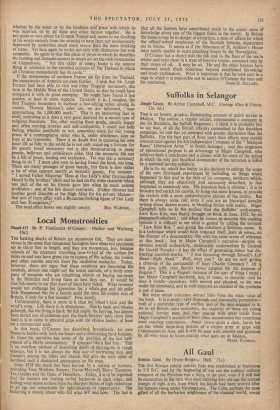Local Monstrosities
TFIE basking sharks of Britain are monstrous fish. They are mon- strous in the sense that competent biologists have observed specimens up to thirty feet in length, and they are monstrous, too, because schools of the creatures travelling nose-to-tail af the surface for miles on end may have given rise to reports of the aefang, the kraken and other marine marvels from the mediaeval bestiaries. Today, however, there are signs that these creatures are becoming the symbols, almost one might say the totem animals, of a lively com- pany of escapists who are inhabiting islands or buying sea-room in the Hebrides and living there as best they can. It would be churlish merely to say that most of them have failed. What reviewer would not exchange his typewriter for a whale-gun and his poky little Hampstead flat for a launch amid the most life-ridden seas of Britain, if only for a few months? Few, surely.
Unfortunately, there is more to it than the wheel's kick and the wind's song. Life there is in abundance. Sharks bask and whales galumph, but the living is hard; the fish staple, the herring, has almost been netted out of existence, and the shark-hunters' tales show how hard it is to come to physical grips,with the elusive basker, at least on a commercial scale.
In this book, O'Connor has described, breathlessly, his own Homeric battles with both the beasts and a diminishing bank balance. At times his narrative has some of the qualities of the last half- minute of a Derby commentary: It splutters like a fast fuse. This is an excellent method of describing deeds of derring-do in rough seaways, but it is not always the best way of portraying men and manners among the inlets and islands that give the west coast of Scotland such a dissipated appearance on the map.
Since 1938 the shark has been harried by a variety of hunters, including Tony Watkins, Sweeny, Gavin Maxwell, Harry Thomson, Tex Geddes and the Duke of Hamilton. Today, it is to be regretted th.it the hunters are hurling verbal harpoons at each other, and dulling what seems to have been the sharpest points of high endeavour in an age not remarkable for individualism or opportunity. The bickering is mostly about who did what first and how. The fact is that all the hunters have contributed much to the scanty store of knowledge about one of the biggest fishes in the world. hi Britain the baskers may be in danger of extinction, a state of affairs for which the official-witted employees of the Scottish fisheries department are to blame. It seems as if the fishermen of St. Andrew's 1-louse were totally unable to resist poaching forays by the Norwegians.
O'Connor has a theory that the fish sink to the floor of the sea in winter and exist there in a state of massiVe torpor, sustained only by their stores of oil. It may be so. He and the other hunters have witnessed much shark behaviour beyond established knowledge and ready explanation. What is important is that he took part in a saga in which it is impossible not to admire O'Connor the man and


































 Previous page
Previous page